
This hymn to Apollo, god both of the Delphic Oracle and of music, was found inscribed on a stone at Delphi. The text is marked with a form of music notation which makes it one of the earliest pieces of music to have survived in the western world. We have no way of determining exactly how the piece would have been performed, but recordings have been made which may convey something of the sound of the work. One version is available on the album “Music of Ancient Greece,” Orata ORANGM 2013 (track 3), and another on “Musique de la Grèce Antique” Harmonia Mundi (France) HMA 1901015 (track 24). Here is a translation of the first part of the Paean.
Oh, come now, Muses, (1)
and go to the craggy sacred place
upon the far-seen, twin-peaked Parnassus, (2)
celebrated and dear to us, Pierian maidens. (3)
Repose on the snow-clad mountain top;
celebrate the Pythian Lord (4)
with the goldensword, Phoebus,
whom Leto bore unassisted (5)
on the Delian rock (6) surrounded by silvery olives,
the luxuriant plant
which the Goddess Pallas (7)
long ago brought forth.
Translated by Richard Hooker
(1) The muses were the goddesses of the arts, the word “music” comes from their name.
(2) Mount Parnassus was the site of the temple of the Oracle of Apollo at Delphi, the most sacred spot in Greece.
(3) The muses were also associated with a place called Pieria near Mount Olympus; but another explanation of the reference is that they were said to be the nine daughters of one Pierus.
(4) Apollo. His priestess was called the Pythia, after a legendary snake that Apollo had killed in laying claim to the shrine.
(5) There are many different accounts of how Apollo’s mother wandered the earth looking for a safe place in which to bear her child.
(6) The island of Delos.
(7) Athena. Note how the Athenian poet, even while praising the chief god of Delphi manages to bring in by a loose association the chief goddess of Athens.
Note: this is misidentified in the printed version of Reading About the World as the First Delphic Hymn.
 This work is licensed under a Creative Commons Attribution-NonCommercial-ShareAlike 4.0 International License.This is an excerpt from Reading About the World, Volume 1, edited by Paul Brians, Mary Gallwey, Douglas Hughes, Azfar Hussain, Richard Law, Michael Myers Michael Neville, Roger Schlesinger, Alice Spitzer, and Susan Swan and published by Harcourt Brace Custom Books. This is an excerpt from Reading About the World, Volume 1, edited by Paul Brians, Mary Gallwey, Douglas Hughes, Azfar Hussain, Richard Law, Michael Myers Michael Neville, Roger Schlesinger, Alice Spitzer, and Susan Swan and published by Harcourt Brace Custom Publishing. The reader was created for use in the World Civilization course at Washington State University, but material on this page may be used for educational purposes by permission of the editor-in-chief: |
Paul Brians
Department of English
Washington State University
Pullman 99164-5020
This is just a sample of Reading About the World, Volume 1. If, after examining the table of contents of the complete volume, you are interested in considering it for use at your own campus, please contact Paul Brians.